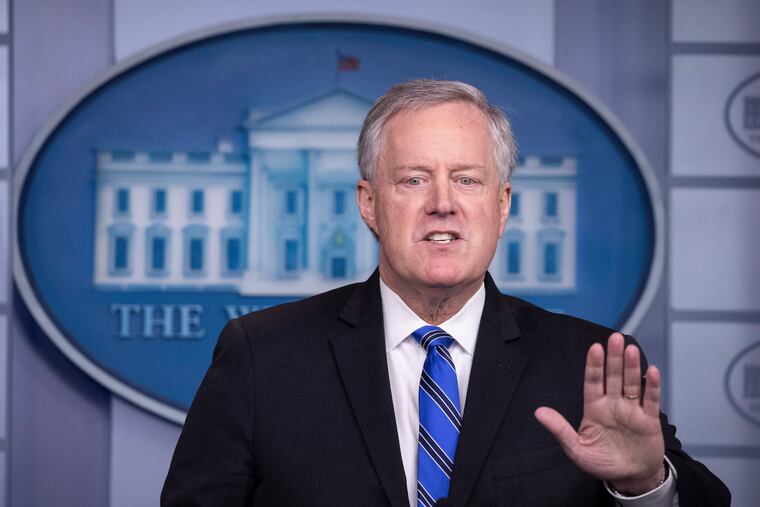Democrats and White House negotiators search for a coronavirus relief deal as Trump threatens to take unilateral steps
Despite the weak economic conditions and the continued spread of the pandemic, a compromise looks distant after days of negotiating.

WASHINGTON — Trump administration negotiators and top congressional Democrats are up against a self-imposed deadline to make a deal on a new coronavirus relief bill, with a potentially critical meeting set for Thursday evening that could determine whether an agreement is possible.
Pressure for a deal is only increasing as some 30 million jobless workers remain without emergency unemployment benefits that expired last week. A moratorium on evictions also recently expired. Meanwhile, a new report on jobless claims on Thursday found that 1.2 million Americans filed jobless claims last week, the 20th straight week more than 1 million people have sought aid.
Despite the weak economic conditions and the continued spread of the pandemic, a compromise looks distant after days of negotiating. Although Democrats suggested they were making progress, albeit slowly, White House chief of staff Mark Meadows declared Wednesday evening that the two sides remained "trillions of dollars apart" and renewed his threat that President Donald Trump would take executive actions on a handful of issues absent an agreement.
Negotiations are set to resume at 5 p.m., and the meeting could be lengthy. Meadows said that if no deal is in sight by Friday, further talks could be futile.
"We're still in need of a breakthrough moment," Meadows told reporters after he and Treasury Secretary Steven Mnuchin met for two hours Wednesday evening with House Speaker Nancy Pelosi, D-Calif., and Senate Minority Leader Charles Schumer, D-N.Y. The group has been meeting almost daily for over a week.
» READ MORE: 1.2 million sought unemployment benefits last week as $600 federal check ended
Meadows accused Pelosi of trying to "wear you down until you finally say 'I've had enough' and you give in to her demands," adding: "I typically will not concede as readily as some might think."
Trump announced at the White House on Wednesday that he was preparing executive actions to renew help for the unemployed, extend the moratorium on evictions, and cut the payroll tax — a longtime goal for the president that is opposed by lawmakers of both parties. Meadows also said the administration was eyeing taking unilateral action on money for schools.
Although Democrats have rejected the idea that Trump could spend money without Congress' approval, the Trump administration has asked federal agencies to identify all of the money they have not yet spent from the $2 trillion Cares Act, which passed in March, according to two people briefed on the effort. White House officials are trying to determine whether this money could be redirected and used for other purposes, such as temporary unemployment benefits.
Democrats insisted that talks must continue until a deal is reached. Schumer said he and Pelosi had confronted Meadows about reports Meadows had told GOP senators that he would not continue negotiating past Friday — although Meadows denied he had been confronted in this fashion.
“This is a huge crisis. We will — our caucuses will only support a bill that meets that crisis,” Schumer said.
"We will stay here as long as it takes to get an agreement," Schumer added. "And we urge Mr. Meadows to sit down and continue to work with us and to do it as long as it takes."
Multiple issues are at play. Democrats' starting point was a $3.4 trillion bill that passed the House in May. Republicans are rejecting spending anywhere near that amount of money, but Senate Republicans are divided. A half-dozen or so Senate Republicans who are up for reelection in November support more generous expenditures, with some supporting hundreds of billions of dollars for state and local governments. Democrats want around $1 trillion in state and local aid, but Trump has dismissed that demand as a "bailout" for mismanaged states, and the administration put $150 billion on the table earlier this week.
Senate Majority Leader Mitch McConnell, R-Ky., has repeatedly acknowledged the divisions in his own conference, with some 20 GOP senators reluctant to spend any more money at all after Congress already approved four bipartisan bills in March and April totaling around $3 trillion. McConnell is not taking part in the talks, and has said he'll support any deal the administration officials and Democrats are able to reach.
Democrats are pushing to renew $600 weekly emergency unemployment benefits that expired last week; the administration has offered $400 weekly through early December. Democrats are also pushing for money for food stamps and child care. The two sides are arguing about money for schools and the postal service. Republicans have sought to link some of the school money to schools reopening, which Democrats oppose. There is a dispute about pensions, and multiple other issues also remain unresolved.